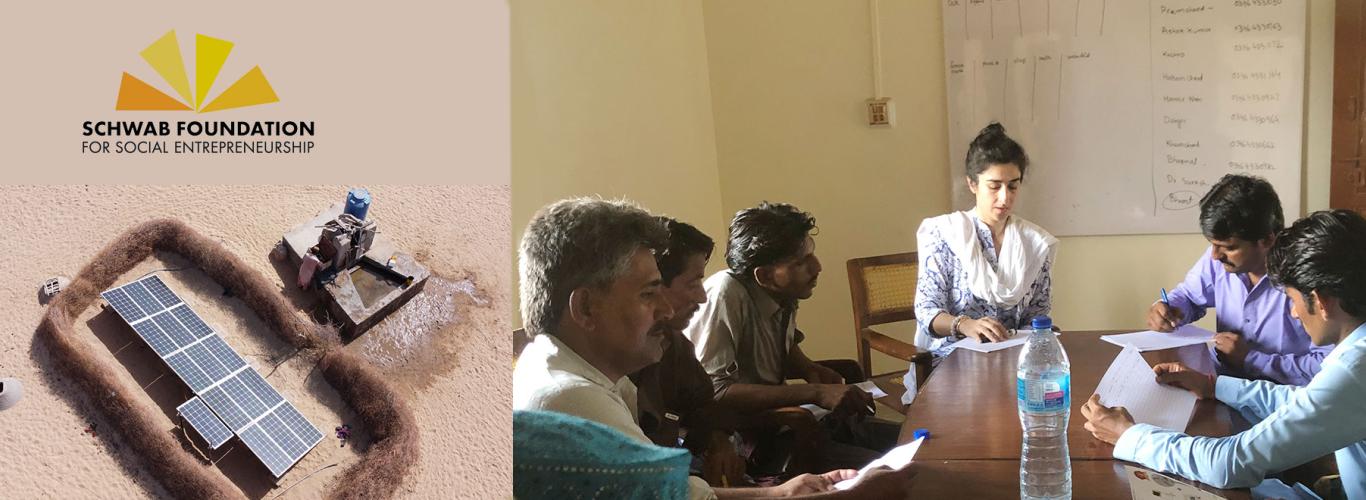Alumna Fariel Salahuddin Selected as Finalist for the Schwab Foundation Social Innovation Awards 2025
Fariel Salahuddin, a 2005 BSc Economics graduate of the Mushtaq Ahmad Gurmani School of Humanities and Social Sciences, has been honoured as a finalist for the Schwab Foundation's Social Innovation Awards 2025.
Her organisation, UpTrade, has been recognised for its transformative impact in the Social Entrepreneurs’ category, in a competitive field of participants from 18 countries. UpTrade enables smallholder, off-grid farming communities to meet their needs by using livestock as currency. They offer a unique service, Goats for Water, through which farmers trade their goats to acquire solar water pumps and other essential equipment.
Salahuddin came up with the idea while working in Sindh on a renewable energy project. She recalls, “I was visiting a village where I saw a broken diesel water pump. The villagers there couldn’t afford to replace it. Meanwhile, as I sat there, I noticed a huge herd of goats returning from grazing. It struck me that while these farmers had livestock, they didn’t have cash to buy the equipment they desperately needed. That’s when I thought: why not let them trade their goats for solar water pumps?”
The project was born out of the sheer spirit to help the women whom Salahuddin saw firsthand, “spending up to four hours every day fetching water. It was disheartening to see communities so dependent on outside help—NGOs, charities, or government aid—without any means to solve these issues themselves.”
“If we could exchange goats for critical assets like water pumps, we could create a system that empowered them economically and sustainably. This led me to start Goats for Water, turning a simple barter idea into a solution for energy poverty,” adds Salahuddin.
One of the biggest challenges that Salahuddin had to face was getting communities to trust a completely new system—trading their goats for something as intangible as solar energy. “It’s not a traditional business model,” explains Salahuddin, “so there’s always a learning curve in terms of convincing people of its value. Managing partnerships and logistics also brings its own challenges. We need to make sure that the technology we’re providing is both affordable and dependable, and that requires a lot of coordination with suppliers and local partners. Also, trying to scale this model across different regions while maintaining our core values has been tough, but rewarding.”
Since 2017, the organisation has been able to reach almost 300 villages, impacting over 100,000 people. Between 2019 and 2020, they doubled the number of people with access to clean water and electricity. As far as the impact on the women of the villages, a satisfied Salahuddin says, “Now, with the solar water pumps, they have more free time and a greater sense of security. In many ways, this project has empowered women by giving them direct access to resources that were previously out of their control. I’ve seen more engagement from women in decision-making processes within the villages, and that shift is incredible.”
She explains that being selected as a finalist for the Social Innovation Awards was a humbling experience. “I am honoured to be in the company of the many innovative and highly impactful social innovators globally. To me, it’s not just a validation of the transformative potential of our model but of the especially important demographic of smallholder farming population we serve and the impact they’re creating for themselves while producing 40% of the food that is consumed globally. It’s also a chance to amplify the work we’re doing with the validation to garner support in scaling our impact for smallholder farmers globally,” says Salahuddin.
Prior to founding UpTrade, she was working as an energy specialist and consultant, with a number of Development Financial Institutions such as Asian Development Bank, World Bank and USAID. Her work there focused on advising governments and the private sector on development of energy projects and policies pertaining to energy generation, transmission and development of tariffs and energy markets in Pakistan, Indonesia, and Egypt.
Today, she works with off-grid farming communities, where people are often rich in livestock but cash-poor. The model is being expanded to wheat farmers enabling them to barter wheat for farming inputs. “It’s about transforming a farmer’s produce and livestock into something that improves their daily and productive lives. What started as Goats for Water has now evolved into making even broader social impact through similar barter systems.”
Not one to stop, Salahuddin is now looking to expand her initiative within Pakistan, where thousands of smallholder farmers could benefit from the system. “The bigger vision is to take this idea global, so we are looking into East Africa, particularly Kenya, where our expansion efforts have begun with local partners. There are over a billion smallholder farmers around the world, and the concept of using livestock and produce as a form of currency can be adapted to diverse cultures and needs. We’re also exploring the idea of creating an open-source model so that communities in different countries can replicate this system themselves. It’s about empowering people to take control of their own resources,” says Salahuddin.
She credits her success to LUMS, which she says taught her “how to think critically and approach problems from multiple perspectives. The University instilled in me a solid foundation in political economics, economics fundamentals, and politics of development, which directly informed my understanding of the challenges faced by rural communities. I believe the interdisciplinary education I received there helped me balance both the social and business aspects of this venture. The LUMS alumni network has been critical, where I have received support from friends and partners who are alumni.” Her organisation is now in process of piloting with wheat farmers with a fellow alumnus who is working with crop warehousing in Punjab.
LUMS wishes her the best of luck for the future.




